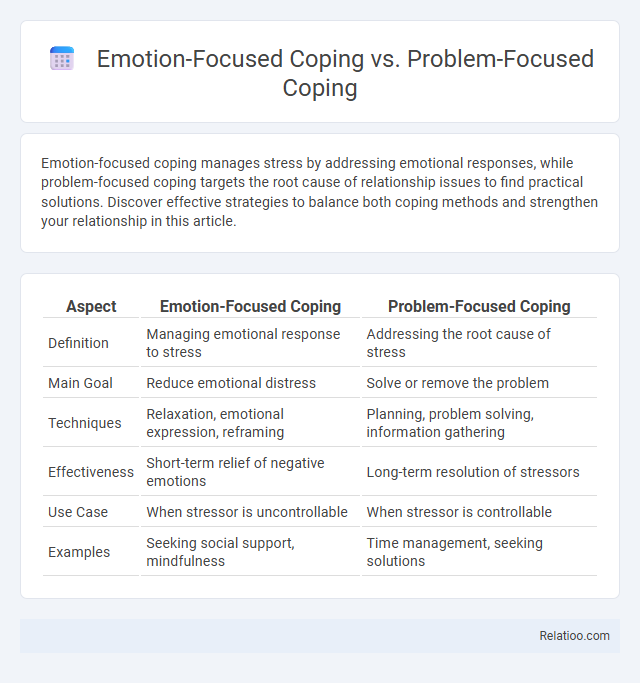Emotion-focused coping manages stress by addressing emotional responses, while problem-focused coping targets the root cause of relationship issues to find practical solutions. Discover effective strategies to balance both coping methods and strengthen your relationship in this article.
Table of Comparison
| Aspect | Emotion-Focused Coping | Problem-Focused Coping |
|---|---|---|
| Definition | Managing emotional response to stress | Addressing the root cause of stress |
| Main Goal | Reduce emotional distress | Solve or remove the problem |
| Techniques | Relaxation, emotional expression, reframing | Planning, problem solving, information gathering |
| Effectiveness | Short-term relief of negative emotions | Long-term resolution of stressors |
| Use Case | When stressor is uncontrollable | When stressor is controllable |
| Examples | Seeking social support, mindfulness | Time management, seeking solutions |
Introduction to Coping Strategies
Emotion-focused coping centers on managing your emotional responses to stress, helping reduce feelings of anxiety or distress. Problem-focused coping targets the source of stress directly by developing actionable solutions to resolve or mitigate the problem. Effective coping skills combine both strategies, enabling you to adapt flexibly and enhance your overall resilience in challenging situations.
Defining Emotion-Focused Coping
Emotion-focused coping involves managing emotional responses to stress rather than directly addressing the stressor, aiming to reduce distress through techniques like mindfulness, relaxation, or seeking social support. In contrast, problem-focused coping targets the root cause of stress by developing solutions or taking actionable steps to eliminate or mitigate the issue. Effective coping skills encompass both emotion-focused and problem-focused strategies, enabling individuals to adapt flexibly to various stressors for improved mental health outcomes.
Understanding Problem-Focused Coping
Problem-focused coping involves actively addressing the source of stress through practical solutions and behavioral changes, making it highly effective for controllable situations. This coping strategy emphasizes problem-solving skills such as time management, information seeking, and decision-making to reduce or eliminate stressors. Understanding problem-focused coping is crucial for developing resilience and improving mental health outcomes by directly targeting and resolving external challenges.
Key Differences Between Emotion-Focused and Problem-Focused Coping
Emotion-focused coping primarily aims to manage emotional distress associated with a situation, such as using relaxation techniques or seeking social support, whereas problem-focused coping targets the root cause by actively addressing or altering the stressor, like creating action plans or gathering information. Coping skills encompass both strategies and are essential tools for psychological resilience, with emotion-focused methods often used when stressors are uncontrollable and problem-focused methods preferred when stressors are changeable. Key differences lie in their focus: emotion-focused strategies regulate feelings to reduce anxiety or sadness, while problem-focused strategies implement practical solutions to eliminate or reduce the stressor itself.
Advantages of Emotion-Focused Coping
Emotion-focused coping enhances your emotional resilience by allowing you to regulate distress and maintain psychological well-being during stressful situations. It promotes adaptive strategies such as mindfulness, acceptance, and positive reframing, which reduce emotional overload and improve mood. Compared to problem-focused coping, emotion-focused coping is particularly advantageous when challenges are uncontrollable or require long-term adjustment.
Benefits of Problem-Focused Coping
Problem-focused coping targets the root cause of stress, enabling you to develop practical solutions that reduce or eliminate the stressor effectively. This approach enhances problem-solving skills, promotes a sense of control, and fosters resilience in challenging situations. Utilizing problem-focused coping results in long-term benefits by addressing issues directly and preventing recurring stress.
When to Use Emotion-Focused Coping
Emotion-focused coping is most effective when individuals face situations beyond their control, such as chronic illness or bereavement, where changing the circumstance is impossible. This coping skill helps manage emotional distress by promoting acceptance, emotional expression, and stress reduction techniques like mindfulness or relaxation exercises. Problem-focused coping, by contrast, is better suited for controllable stressors requiring active problem-solving or decision-making efforts.
Situations Suited for Problem-Focused Coping
Problem-focused coping is most effective in situations where you can directly influence or change the stressor, such as tackling work deadlines, resolving conflicts, or managing financial issues. This coping skill involves active problem solving, seeking information, and taking steps to alter the source of stress. Emotion-focused coping is better suited for uncontrollable situations, while problem-focused coping empowers your proactive response to challenges within your control.
Integrating Both Coping Strategies for Resilience
Integrating emotion-focused coping and problem-focused coping enhances your resilience by addressing both emotional responses and practical challenges effectively. Emotion-focused coping helps manage stress through techniques like mindfulness and emotional expression, while problem-focused coping empowers you to tackle the root causes of stress via planning and problem-solving. Developing strong coping skills by combining these strategies promotes adaptive responses, reduces psychological distress, and fosters long-term mental well-being.
Choosing the Right Coping Method for Personal Well-being
Choosing the right coping method for your personal well-being involves understanding the differences between emotion-focused coping, which targets managing your emotional response, and problem-focused coping, which addresses the root cause of stress. Effective coping skills incorporate both approaches, allowing you to regulate feelings while actively solving problems. Tailoring your strategy to the situation enhances resilience and promotes overall mental health.

Infographic: Emotion-Focused Coping vs Problem-Focused Coping
 relatioo.com
relatioo.com